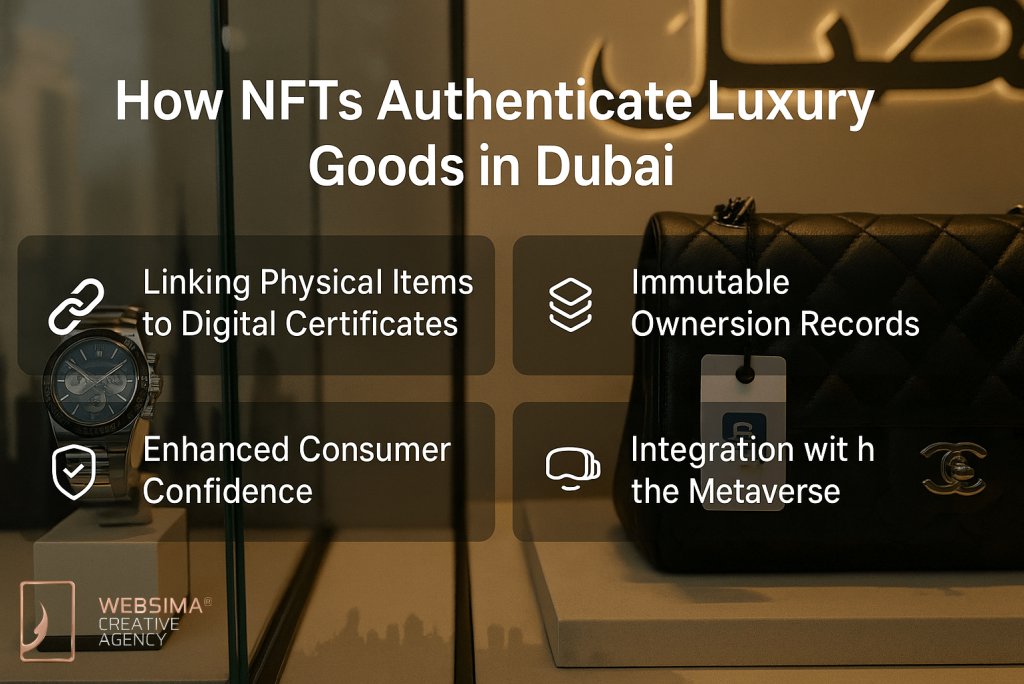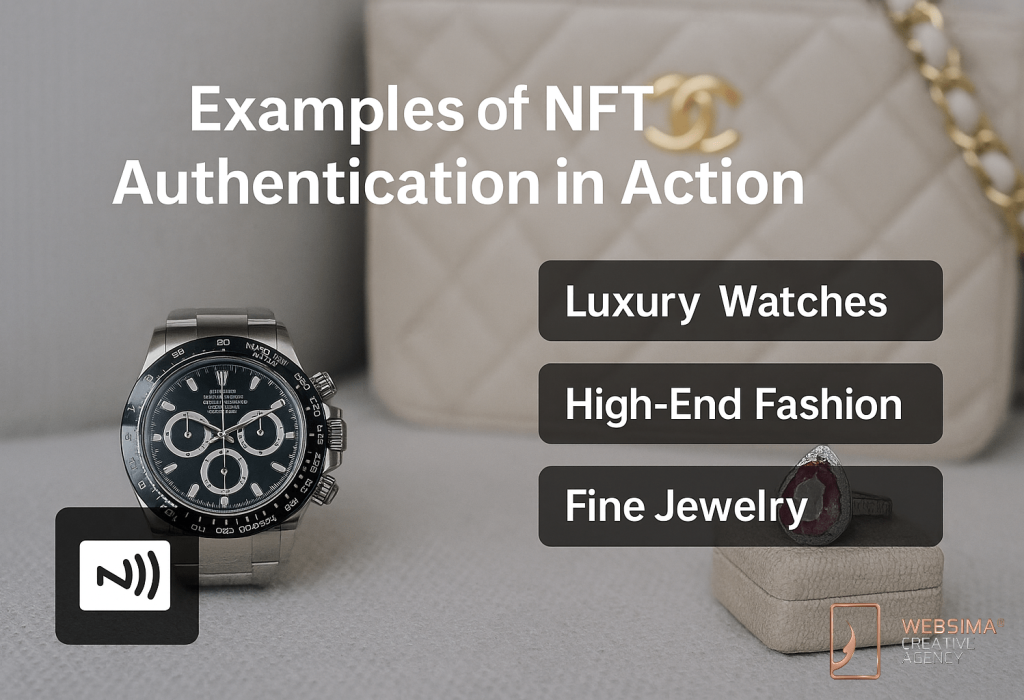Table of Contents
- Introduction
- The Growing Need for Authenticity in Dubai’s Luxury Market
- Understanding NFT Authentication for Luxury Goods
- How NFTs Authenticate Luxury Goods in Dubai
- Benefits of NFT Authentication for Dubai’s Luxury Market
- For Consumers
- For Brands
- For Regulators and Marketplaces
- Examples of NFT Authentication in Action
- Luxury Watches
- High-End Fashion
- Fine Jewelry
- Challenges and Considerations
- The Future of NFT Authentication in Dubai’s Luxury Sector
- Conclusion
- Websima’s Expertise in Blockchain and NFT Solutions
Introduction
Dubai’s reputation as a global hub for luxury goods is unmatched in the Middle East, with its thriving markets for high-end fashion, fine jewelry, rare timepieces, and exclusive collectibles. However, as demand for these products grows, so does the risk of counterfeiting. The NFT for luxury in Dubai concept is emerging as a cutting-edge solution, using blockchain-based tokens to verify authenticity and track ownership histories.
By linking physical luxury items to non-fungible tokens (NFTs), or in other words making RWA NFTs in Dubai, brands and buyers can ensure a secure, transparent, and immutable record of provenance — something traditional certificates struggle to guarantee. This article explores how NFTs are reshaping the authentication process for Dubai’s luxury market, the technology behind it, and what it means for consumers, brands, and regulators.
The Growing Need for Authenticity in Dubai’s Luxury Market
Louis Vuitton, one of the worlds oldest and most important fashion brands founded in 1854, has now entered the NFT space.
This is a monumental event in the history of luxury and fashion, as the Maison looks towards crypto and the future of digital collectibles.
(1/16) pic.twitter.com/nBQuuB2hW5
— Farokh (Perma/Bull) (@farokh) June 9, 2023
Dubai’s luxury goods sector is projected to continue growing steadily, driven by its position as a tax-free shopping destination, a hub for high-net-worth individuals (HNWIs), and a magnet for global luxury brands. According to Statista, the UAE’s luxury goods market is expected to generate over USD 3.7 billion in revenue by 2027.
Yet, this booming industry faces a persistent challenge: counterfeit products. Luxury counterfeits can undermine brand trust, devalue genuine goods, and expose consumers to substandard materials. While traditional authentication methods — such as paper certificates, holograms, or brand-specific serial numbers — can be forged, NFTs bring a new level of security by leveraging blockchain’s immutable ledger.
Understanding NFT Authentication for Luxury Goods
Non-Fungible Tokens (NFTs) are unique cryptographic assets recorded on a blockchain. Unlike cryptocurrencies such as Bitcoin, which are interchangeable, NFTs are one-of-a-kind, each representing a distinct item or piece of content.
When applied to luxury goods:
- An NFT contains metadata about the product (brand, model, serial number, production date, and more).
- The NFT is permanently stored on a blockchain, ensuring the record cannot be altered or deleted.
- The NFT can be transferred to new owners, creating a transparent chain of custody.
For instance, a luxury watch sold in Dubai could have a matching NFT that details its full provenance, maintenance records, and original purchase location.
How NFTs Authenticate Luxury Goods in Dubai

1. Linking Physical Items to Digital Certificates
Luxury brands embed NFC chips, QR codes, or other scannable identifiers inside the product or its packaging. Scanning these identifiers links directly to the NFT, allowing instant verification.
2. Immutable Ownership Records
Each transfer of ownership — whether a sale, gift, or auction — is recorded on the blockchain. This means buyers in Dubai’s vibrant resale markets can easily verify whether an item is authentic and whether the seller is the rightful owner.
3. Enhanced Consumer Confidence
For HNWIs and collectors, purchasing an NFT-backed luxury product in Dubai removes much of the uncertainty about authenticity.
4. Integration with the Metaverse
Some brands are offering digital twins of luxury items as NFTs, enabling owners to showcase their pieces in metaverse spaces or gaming environments.
Benefits of NFT Authentication for Dubai’s Luxury Market
Consumers
- Guaranteed Authenticity: Direct verification through blockchain reduces the risk of counterfeits.
- Ownership Transparency: Clear record of ownership changes builds trust.
- Resale Value: NFT-backed items can command higher resale prices in Dubai’s secondary luxury markets.
Brands
- Anti-Counterfeit Measures: Stronger brand protection against fakes.
- Customer Engagement: NFTs can include perks like VIP event access or exclusive brand experiences.
- Data Insights: Brands can see secondary market movements for their products.
Regulators and Marketplaces
- Customs Verification: Authorities can quickly authenticate items during import/export.
- Compliance Tracking: Facilitates monitoring for intellectual property protection.
Examples of NFT Authentication in Action

Luxury Watches
Dubai’s strong collector community has embraced NFT authentication for rare timepieces. Platforms like Arianee and Watch Certificate offer blockchain-based certificates that accompany each watch through its lifetime.
High-End Fashion
Luxury fashion houses such as Gucci and Louis Vuitton have tested NFT-based authentication systems. These could be integrated into Dubai Mall’s luxury boutiques, giving customers instant product verification via smartphone scan.
Fine Jewelry
Diamonds and gemstones, sold in districts like Deira Gold Souk, can be paired with NFTs that record sourcing, grading, and ownership history, enhancing trust for high-value transactions.
Challenges and Considerations
While the NFT for luxury in Dubai model offers immense potential, adoption faces certain challenges:
- Technology Integration: Brands must implement NFC or QR coding at production.
- Consumer Education: Not all buyers are familiar with blockchain technology.
- Blockchain Selection: Choosing a secure, sustainable blockchain is critical.
- Regulatory Alignment: NFT royalty in Dubai secondary market must become in compliance with UAE’s digital asset regulations, particularly under the Dubai Virtual Assets Regulatory Authority (VARA) framework.
The Future of NFT Authentication in Dubai’s Luxury Sector
Dubai’s positioning as a global blockchain hub, combined with its thriving luxury goods sector, makes it an ideal environment for NFT authentication adoption. Expect to see:
- More NFT-Backed Luxury Auctions: Especially in art and rare collectibles.
- Integration with Smart Contracts: Automating warranty claims and after-sales services.
- Luxury-Metaverse Synergy: Digital twins of physical goods gaining popularity.
Conclusion
The NFT for luxury in Dubai approach is not just a trend — it’s becoming a vital tool for preserving authenticity, protecting brand value, and instilling buyer confidence in one of the world’s most dynamic luxury markets. By linking physical products to blockchain records, the luxury sector can achieve transparency and security levels never before possible.
As adoption spreads, Dubai’s luxury buyers and brands stand to benefit from a safer, smarter, and more connected luxury ecosystem — one where authenticity is not just promised but digitally guaranteed.
Websima’s Expertise in Blockchain and NFT Solutions
At Websima, we help luxury brands, marketplaces, and innovators implement blockchain-based authentication systems, from NFT creation and integration to secure data management. Our blockchain and Web3 expertise ensures your solution is compliant with Dubai’s regulatory framework while delivering exceptional user experiences.
Whether you’re a high-end retailer, an online luxury marketplace, or a brand seeking to protect your products, we can design and deploy an NFT authentication system tailored to your needs. Let’s make your luxury products not just desirable, but probably authentic.
Get in touch today to explore how Websima can bring NFT authentication to your luxury business in Dubai.





